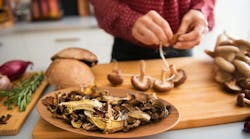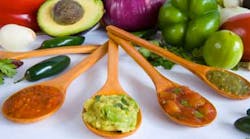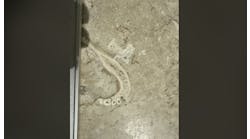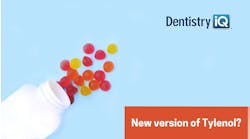Can the food we eat help prevent dental decay? When we explored this question for our senior capstone project, we looked into the therapeutic benefits of food, culinary medicine, and preventive medicine.
One of the things we found is the fascinating shiitake mushroom.
History of the shiitake mushroom
First cultivated in China between 1000 and 1100 A.D., the shiitake is revered in Asia for its culinary and reputed medicinal qualities, and it’s become the second most cultivated mushroom in the world.1 Eating shiitake mushrooms has been shown to fight against plaque-building bacteria in the mouth because they contain an antibacterial compound called lentinan.2 The mushrooms have also been found to have anticariogenic, antibacterial, and anti-inflammatory effects in the oral cavity.3
Although the research is in the preliminary stages, studies show that shiitake mushroom extract is an effective antibacterial and antibiofilm agent against oral pathogens such as P. gingivalis, Streptococcus mutans, and multispecies biofilms.4 The research suggests that shiitake mushroom extract has been used as an oral antibiofilm agent in the treatment of dental decay and periodontal disease. The mushroom’s medicinal substance may be an effective whole food addition to the dietary and anticaries agents we usually discuss with our patients.
We’ve found that many of our patients are interested in complementary approaches to optimizing their oral care. Called integrative health, this brings traditional and complementary care together in a coordinated way.5 Coordinating health prevention strategies to include cooking weaves dental care into people’s lifestyle and diet. A healthy smile depends on brushing, flossing, and a balanced diet with adequate nutrients.
Therefore, as an option to suggest with your patients, we’ve included a shiitake mushroom recipe below.
Diet ties into the oral-systemic link
Many health conditions can increase the risk of oral diseases, and poor oral health can negatively affect many general health conditions and the management of those conditions. Most oral diseases share common risk factors with chronic diseases such as cardiovascular disease, diabetes, cancers, and respiratory diseases. Moreover, an unhealthy diet is a significant risk factor for achieving optimal oral health.6
The 2022 WHO Global Oral Health Status Report estimated that oral diseases affect nearly 3.5 billion people worldwide, with 514 million children suffering from caries on primary teeth.7 As dental hygiene students, we’ve learned the importance of educating patients about adequate oral home care, brushing twice daily with fluoridated toothpaste, and flossing at least once daily. We also provide nutritional counseling because diet plays an essential role in systemic and oral health. There are readily available dental products with shiitake extracts, including Emerson Ecologics Dentalcidin toothpaste with biocidin and Emerson Ecologics LS Oral Care Solution.
When we explored the advantages of shiitake mushrooms for oral health, we were guided by mentors who assisted us in our academic and professional development and emphasized the importance of a reliable support system. We encourage student hygienists to think outside the box when it comes to providing nutritional counseling to their patients.
Dental hygienists must maintain the core values of veracity and beneficence and ensure that what we suggest to patients is scientifically proven to have a positive effect on oral health. We wish for future dental hygienists to evolve with the innovations that the advancing dental field offers, to stay curious, and to never stop learning. The thirst for knowledge will set them apart and allow them to provide the best possible care for their patients.
We’re proud to share an oral health broth that exemplifies the integrative health approach. We hope you share this recipe with your patients.
Shiitake mushroom broth (3-4 servings)
Ingredients
6 cups water
2 cups dried shiitake mushrooms
1 onion skin removed, chopped
2–3 cloves garlic, minced
1-inch piece of ginger, sliced
2–3 tablespoons soy sauce or tamari (adjust to taste)
1 tsp of oil
1 tablespoon miso paste (optional, for extra flavor)
Salt and pepper (optional)
Preparation: Place dried shiitake mushrooms in a bowl and cover them with hot water. Slice and let the mushrooms soak for about 20-30 minutes until soft. Save the soaked water.
Aromatics: In a large pot, heat a small amount of cooking oil over medium heat. Add the chopped onion, minced garlic, and sliced ginger. Sauté for 2–3 minutes until the onions are translucent and fragrant.
Simmer: Measure 6 cups of shiitake mushroom-soaked water, adding more water if necessary to make the total broth 6 cups. Once the broth reaches a boil, add aromatics, reduce the heat to low, and let it simmer for at least 30–40 minutes. This allows the flavors to combine and the mushrooms to release their essence into the broth.
Season: After simmering, add soy sauce or tamari to taste. You can also add a tablespoon of miso paste for extra depth of flavor if desired. Season with salt and pepper as needed.
Strain and serve: Once the broth has simmered and infused with the flavors, strain it through a fine mesh sieve or cheesecloth to remove the solids. Discard the solids. Your shiitake mushroom broth is now ready to enjoy! You can store the leftovers in a sealed container in the refrigerator for three to five days.
References
1. King MW. A great cultural export from Asia to the rest of the sorld. Clark University. December 7, 2018. https://clarknow.clarku.edu/2016/06/23/a-great-cultural-export-from-asia-to-the-rest-of-the-world/
2. Shouji N, Takada K, Fukushima K, Hirasawa M. Anticaries effect of a component from shiitake (an edible mushroom). Caries Res. 2000;34(1):94-98. doi:10.1159/000016559.
3. Avinash J, Vinay S, Jha K, Das D, Goutham BS, Kumar G. The unexplored anticaries potential of shiitake mushrooms. Pharm Rev. 2016;10(20):100-104. doi.10.4103/0973-7847.194039
4. Solmaz G, Ozen F, Ekinci Y, Bird PS, Korachi M. (2013). Inhibitory and disruptive effects of shiitake mushroom (Lentinula edodes) essential oil extract on oral biofilms. J Microbiol. 2013;6(9):e9058. doi.10.5812 /jjm.9058
5. Complementary, alternative, or integrative health: What’s in a name? National Center for Complementary and Integrative Health. April 2021. https://www.nccih.nih.gov/health/complementary-alternative-or-integrative-health-whats-in-a-name
6. Tenelanda-López D, Valdivia-Moral P, Castro-Sánchez M. Eating habits and their relationship to oral health. Nutrients. 2020;12(9):2619. doi.10.3390/nu12092619
7. Oral health. World Health Organization. March 14, 2023. https://www.who.int/news-room/fact-sheets/detail/oral-health
Kristen Simmons, PhD, RDH, is an assistant professor at Pacific University School of Dental Hygiene Studies. In 2020, she completed her doctoral degree in education and leadership from Pacific University. Kristen is actively involved in various initiatives aimed at improving the quality of oral health care.
Jessica Silebi, BSDH (c), Gala Vo, BSDH (c), and Chanel Jung, BSDH (c) are candidates for their BS in dental hygiene at Pacific University Oregon College of Health Professions who will graduate in the summer of 2024.
Chelsie Falk, ND, holds a Naturopathy Certification by a board and serves as a mentor to the authors.








